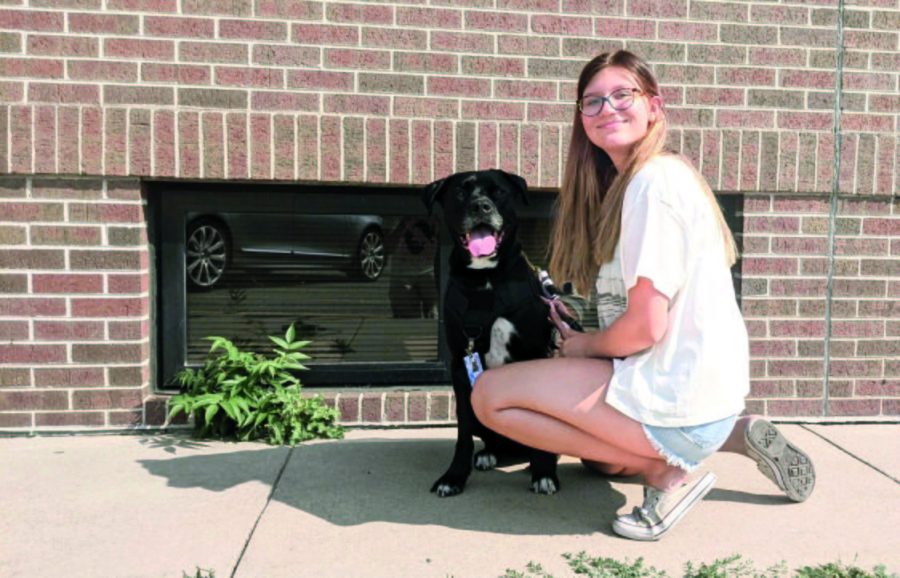Working Like A Dog
Meet Amanda Webb and her service dog, Nero
October 29, 2021
Having something that makes you stand out from the crowd is difficult, but freshman Amanda Webb is taking it in stride. She stands out thanks to the big black dog that accompanies her through the halls and to all of her classes. Webb has had to deal with people disrespecting her invisible disability all day, every day.
“Just because you can’t see a disability doesn’t mean it’s not there,” Webb said.
Webb, who was diagnosed with epilepsy four years ago, has been working with Nero for three years. Nero helps to calm her down, and works to warn her when a seizure is impending. He also works to protect Webb when she has a seizure, as she can’t speak, move, or defend herself.
“I’ve had people try and attack me, because I’m in a vulnerable state,” Webb said.
Dogs can use their heightened sense of smell to detect the possibility of a seizure up to 45 minutes prior.
During class, Webb’s accommodation lets Nero – a German shepherd, Cane Corso, and boxer mix – lie down beside her during regular classwork. “The dog normally just comes in and usually sprawls out on the floor, and you don’t even notice him,” Webb’s advisory teacher, Cameron Moon, said.
During special coursework, like tests, Nero will lie down on the floor, and Webb will come down next to him. Nero does this because of the stress during tests, which may trigger a seizure. “He’ll start pawing me, signaling that something’s wrong.” Webb said, if he feels that she may have a seizure coming on. “That’s something that may happen.”
Webb and Nero have been working together for so long, she’s used to people saying things about him.“When I’m walking, I do hear all kinds of comments like, ‘oh my gosh, he’s so cute.’ Those comments I don’t mind at all.” A smile spreads across her face as she thinks about Nero’s “puppy dog face.”
Now, having Nero alongside her does draw some eyes, but not all spread compliments about her dog.
“People say things like, ‘Why does she have a service dog?’ ‘She’s not blind, she’s probably just crazy,’” Webb said.
These comments are what drive Webb to teach people about her disability and others. She feels strongly that people who use service dogs aren’t treated well overall, whether they’re at school or at home, and wants to utilize the public eye to teach people about different disabilities and how some require service dogs.
Epilepsy is a chronic condition that results in a recurrence of different types of seizures, but does not have a defined cause. The electrical occurrences that produce symptoms happen in the brain. Seizure symptoms can affect multiple parts of the body, but it varies from person to person. According to the CDC, a little more than 1% of the population have epilepsy, or about 3.4 million people. It was also found that Colorado has 56,800 confirmed cases of epilepsy.
“People with disabilities should be treated like a normal human and be treated exactly the same way you would treat anyone else.” But, Webb said, her hands waving in emphasis, “they’re a person who has something different about them, and it’s truly beautiful and amazing.”


![Messages to those affected by the 9/11 attacks featured on the bottom of the front page of The Union St. Journal's Sep. 20, 2001 issue. Due to the long turnaround time of a high school newspaper, students were unable to feature more stories on 9/11 in the September issue, but filled the front page of the Oct, 18, 2001 issue (below) with 9/11-related articles. For teachers, supporting students – and figuring out how to manage their own emotions – was difficult. "We were instructed that counselors would be available should anyone need to talk. It felt like a surreal kind of dream," math teacher Jim Padavic said. "Once they [the Twin Towers] fell, there was a helplessness and sadness and disbelief that this could happen in America. The visuals of firemen and policemen volunteering to enter the towers to help followed by the collapse of the towers was gut-wrenching."](https://unionstreetjournal.com/wp-content/uploads/2021/09/IMG_2701-300x137.jpg)



















